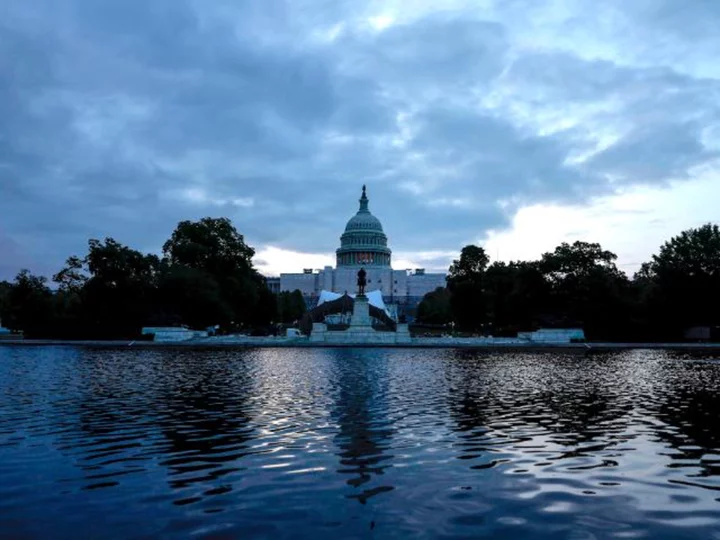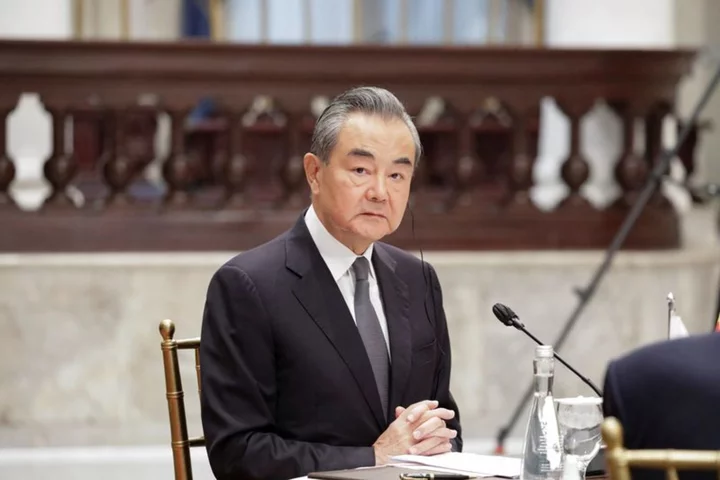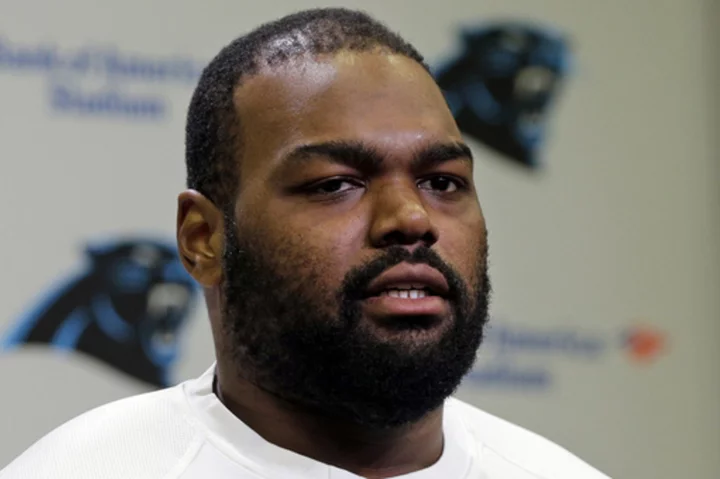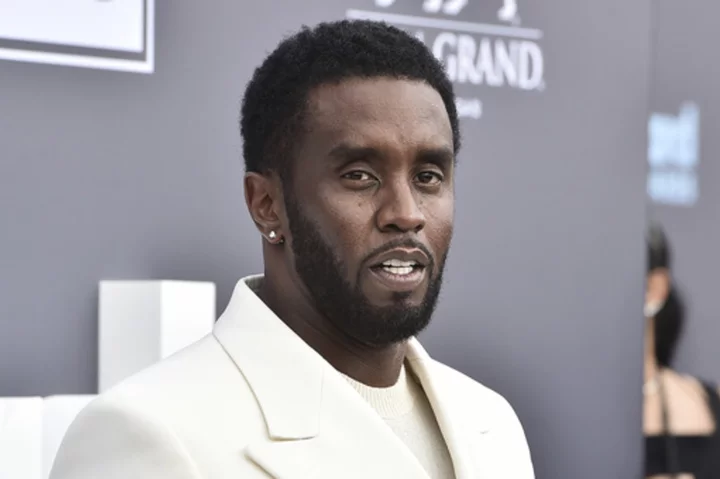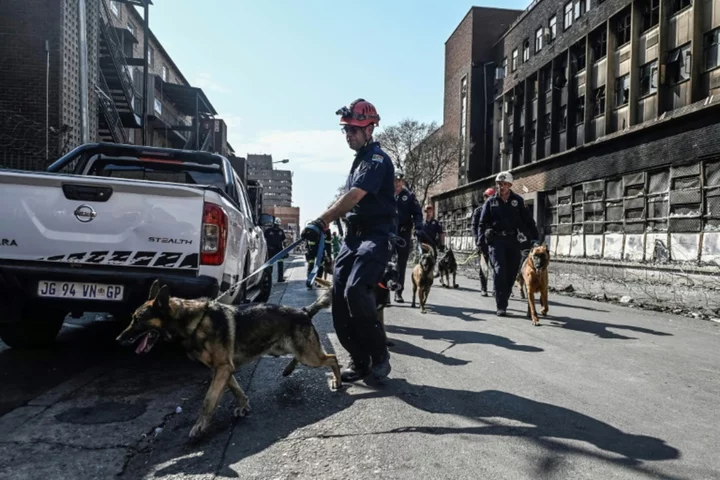In a presidential contest cycle, Senate races don't get the same kind of attention when there's still a year to go until Election Day. But the start of the second fundraising quarter earlier this month brought a host of new candidate names -- some declared and some still biding their time -- that will help shape the race for control of the chamber in 2024 and the ultimate power dynamics for whoever is president in 2025.
With more candidates launching their campaigns this month, the prospect of competitive primaries has become more real -- especially on the Republican side. That's especially true in the top three seats most likely to flip, which represent the GOP's best chances to pick up the one or two seats they'd need to control the chamber, depending on who wins the presidency. (Rankings are based on CNN's reporting, fundraising figures and historical data about how states and candidates have performed.)
West Virginia's GOP primary -- mainly between the governor and a congressman -- was already brewing, but it's looking even more contentious with outside groups like the Club for Growth's political arm touting the millions they're planning to spend. This race will be a marquee battle between the national GOP's more establishment forces and the conservative outside group. And, as in other races like Montana and Nevada, this one will test the National Republican Senatorial Committee's new strategy of picking sides in primaries.
It's impossible to talk about Republican primaries without discussing former President Donald Trump. Ever since 2016, loyalty to him has been a key litmus test for the GOP -- often much more than actual conservatism. But adherence to his election conspiracy theories has sometimes hurt Republicans in general elections, with the 2022 midterms being a prime example.
The chairman of the NRSC, Montana Sen. Steve Daines, has endorsed Trump. And for now, at least, the former president appears to be playing along. CNN reported that he's informed two House Freedom Caucus members whom he's previously backed -- in West Virginia and Montana -- that they won't have his support for the Senate. (In Montana, Rep. Matt Rosendale hasn't yet announced his campaign but is expected to challenge the NRSC's preferred candidate.)
This month's ranking isn't all about primary drama, however. In Pennsylvania, Republicans breathed a major sigh of relief in May when election denier Doug Mastriano, fresh off his 15-point gubernatorial loss, decided not to run. The expectation that Dave McCormick will get into the race with a clearer lane -- and the GOP's lack of candidates right now in other states -- bumps the Keystone State up one spot on this list as slightly more likely to flip.
Overall, the Senate map remains an offensive opportunity for Republicans. Democrats hold seven of the 10 seats most likely to flip next year, an independent holds one and Republicans hold two -- a breakdown that's unlikely to change much, although the order of the ranking will likely evolve in the months to come.
1. West Virginia
Incumbent: Democrat Joe Manchin
Sen. Joe Manchin is in the spotlight after a trip to New Hampshire sparked speculation about a potential third-party presidential bid. The moderate Democrat -- widely seen as the only Democrat who could hold this Senate seat in a state Trump twice carried by double digits -- has said he won't make a decision about running for reelection until the end of the year. He did step up his fundraising in the second quarter, which is usually a sign an incumbent is gearing up for another race. For now, he appears to be keeping his options open while watching the Republican primary boil.
National Republicans are firmly behind Gov. Jim Justice -- a Democrat-turned-Republican whose party switch mirrors the partisan realignment of the state. He's up against Rep. Alex Mooney, a member of the House Freedom Caucus with strong backing from the Club for Growth Action, which, along with an allied super PAC, has announced raising nearly $13.6 million to support his bid. Justice, who raised more money than Mooney in the second quarter but trails in cash on hand, is also likely to have plenty of outside help. National Republicans see the popular governor and Trump ally as the more formidable option to take on Manchin -- and Democratic attacks on Justice would indicate that they agree. Mooney, a five-term member of the House who previously served in the Maryland legislature, doesn't start with the same statewide recognition.
A Trump endorsement could be key in a state he won by nearly 40 points in 2020. The former president has privately suggested to Mooney that the congressman is unlikely to be getting his backing, CNN reported. But regardless of which Republican emerges on top, Mancin -- who won reelection by just 3 points in 2018 against an underwhelming challenger -- will be in for a tough race if he runs. No one's likely to steal the "most likely to flip" spot from West Virginia anytime soon.
2. Montana
Incumbent: Democrat Jon Tester
National Republicans have landed a candidate they think can defeat Democratic Sen. Jon Tester in what's likely their second-best pick-up opportunity. Former Navy SEAL Tim Sheehy launched his campaign in late June, quickly picking up the backing of Gov. Greg Gianforte and Rep. Ryan Zinke as well as senators from around the country. And while some of those endorsements may not curry much favor with Montana voters, they're less the intended audience than Rep. Matt Rosendale, who lost to Tester in 2018 and is expected to launch his own Senate bid.
Rosendale only raised about $443,000 in the second quarter -- a far cry from what would be needed for a top-tier race -- but he'd likely start a primary with name recognition from his previous statewide bids. The Freedom Caucus member could benefit from assistance from the political arm of the Club for Growth, potentially setting up another duel between the conservative anti-tax group and the establishment GOP, although the group has sounded less committed to him recently. As in West Virginia, the former president appears -- for now -- to be cooperating with Senate leadership. Although he campaigned for Rosendale in his 2018 race, Trump recently told the congressman that he wouldn't get his backing, CNN reported.
This likely contentious primary would also test the national GOP's ability to see their preferred candidate through to the general election. Democrats are already pouncing on Sheehy as a wealthy transplant and questioning his rancher bona fides, seizing on an attack they used effectively against Rosendale five years ago. Tester's brand as a working dirt farmer has helped him defy the state's partisanship in the past, and he raised an impressive $5 million in the second quarter.
3. Ohio
Incumbent: Democrat Sherrod Brown
The Republican primary to take on Democratic Sen. Sherrod Brown got a little more crowded this month with the entrance of Ohio Secretary of State Frank LaRose. Unlike in the two other Trump states with Democratic incumbents that top this list, national Republicans are staying neutral in this primary for now.
Businessman Bernie Moreno, who has received warm nods from Trump and has the backing of Sen. J.D. Vance, raised nearly $2.3 million in the second quarter. State Sen. Matt Dolan, who finished third in last year's primary after running as a conservative outside the Trump lane, is also in the race. It remains to be seen if Dolan can win a primary with that positioning, but with a family that owns the Cleveland Guardians baseball team, he's got plenty of resources to try and is already on TV with ads about the border and touting sheriff support. He loaned his campaign $1 million and raised $320,000 in the second quarter.
LaRose doesn't have those personal resources, but he does have name recognition as a statewide elected official who won reelection by 20 points last year. A week after launching his campaign and ahead of a dinner at Trump's Bedminster, New Jersey, golf club with Ohio lawmakers, he reversed his decision not to endorse in the presidential race because of his role as an election official and backed the former president, noting that they "don't agree on every point of style or substance." LaRose is also a prominent player in this year's battle over abortion rights in Ohio -- an issue he could parlay in a GOP primary. He's pushing an August ballot measure that would make it more difficult to amend the state constitution, which he has admitted is intended to push back against another November ballot measure that would enshrine abortion rights in the constitution.
Brown, meanwhile, raised $5 million in the second quarter. With a strong economic populist streak, the senator has a history of winning here, but the increasingly rightward shift of the state makes it highly competitive territory regardless of which Republican emerges.
4. Arizona
Incumbent: Independent Kyrsten Sinema
Ask any political strategist about Arizona, and the response is generally a shrug. There remain a lot of unknowns in this highly competitive state -- chief among them whether the incumbent, Democratic-turned-independent Sen. Kyrsten Sinema, is running for reelection. She already has a challenger on the left. Democratic Rep. Ruben Gallego raised about $3.1 million -- almost double what Sinema did in the second quarter, although she still has a healthy cash-on-hand advantage with about $10.8 million in the bank.
The GOP side has been relatively quiet since Pinal County Sheriff Mark Lamb, who raised about $600,000 during the quarter, announced his bid earlier this year. But all eyes are still on failed 2022 gubernatorial nominee Kari Lake to see whether she'll run for Senate. After spending much of the year thus far challenging her 2022 loss, Lake has been busy cozying up even closer to Trump. She appeared outside the courthouse at his federal arraignment in Miami last month and she recently stumped for him in Iowa. National Republicans aren't getting involved here right now, but it's clear Lake's election conspiracy theory rhetoric isn't the message they're looking for in a state President Joe Biden narrowly flipped in 2020. Lake has met with the NRSC, however, and Daines recently told CBS News she was receptive to his message about the importance of focusing on the future.
Whether she changes her tune in public anytime soon, though, remains to be seen. Her best shot could be if this is a three-way race and Gallego and Sinema end up splitting votes. But given the red tilt of this recently purple state, Arizona remains No. 4 despite an uncertain candidate field.
5. Nevada
Incumbent: Democrat Jacky Rosen
Republicans welcomed retired Army Captain Sam Brown into the race to take on Democratic Sen. Jacky Rosen, with Daines sending out a fundraising email for him soon after he announced his candidacy in mid July. Brown, however, won't have the race to himself.
Former state Assemblyman Jim Marchant is running for the GOP Senate nod after losing last year's secretary of state race. He also lost a general election for US House in 2020, but his campaign was quick to point out his primary track record in slamming Brown's entrance into the race. (Brown lost last year's Senate nomination by more than 20 points.) Marchant only raised about $112,000 in the second quarter and burned more than half that, leaving him with $43,000.
While national Republicans see Marchant's lackluster fundraising and espousal of Trump's election conspiracy theories as a liability, it remains to be seen whether primary voters will feel differently. Americans for Prosperity Action, the Koch-backed outside group, backed Brown last week. This race will be yet another key test of how much the national GOP is willing to do to help their preferred candidates secure the nomination.
But even if they're successful, Brown -- who moved to the state in 2018 -- remains relatively untested. Severely burned by the explosion of a roadside bomb in Afghanistan, he's leaning into his military service and trying to tie Rosen -- who served one term in the US House before being elected to the Senate in 2018 -- to Washington, DC. Rosen raised $2.7 million in the second quarter and will be running for a second term in a state Biden carried by about two points in 2020.
6. Wisconsin
Incumbent: Democrat Tammy Baldwin
Republicans still don't have a top recruit to take on Democratic Sen. Tammy Baldwin after Rep. Mike Gallagher passed on the race. They are watching two businessmen, though, who could have the ability to self-fund: Eric Hovde, who lost the Republican Senate nomination in 2012, and Scott Mayer, who's never run for office before. Meanwhile, Rep. Tom Tiffany's $114,000 second quarter haul doesn't suggest he's getting ready to run statewide. Controversial former Milwaukee County Sheriff David Clarke has said any decision isn't coming soon. He was the best known potential GOP candidate in a Marquette University Law School Poll last month, but he'd likely pose problems for the GOP as nominee in a state Biden narrowly carried.
For now, Baldwin has the race largely to herself. She raised $3.3 million in the second quarter, although any cash advantage could disappear if she ends up facing a self-funder. Among registered voters, 40% viewed her favorably in that Marquette poll, while 37% viewed her unfavorably and 22% hadn't heard enough to have an opinion, which suggests she has room to reintroduce herself to voters as she runs for a third term. Her narrowly positive favorability rating may not seem wildly impressive for a two-term incumbent, but GOP Sen. Ron Johnson, who won reelection last fall, was faring worse at this point in the cycle two years ago.
7. Pennsylvania
Incumbent: Democrat Bob Casey
Pennsylvania moves up one spot on this month's ranking. Republicans dodged a bullet when state Sen. Doug Mastriano, the state's most well-known election denier and failed 2022 gubernatorial nominee, decided in late May not to run for the GOP Senate nod to take on Democratic Sen. Bob Casey, leaving the GOP lane clearer for Dave McCormick. The former hedge fund executive, who lost last year's Senate nomination to the Trump-backed Mehmet Oz, would bring vast personal resources to the race -- an appealing prospect as the GOP tries to unseat a three-term incumbent who comes from a well-known Pennsylvania family. (Casey's father was a two-term governor.)
With the ability to self-fund, McCormick doesn't appear to be in any rush to announce, although he already picked up an endorsement from Americans for Prosperity Action. Even if he doesn't have a competitive primary, he could have liabilities from his last one -- when he veered right in hopes of securing Trump's endorsement -- that could cost him among suburban voters in a general election.
Still, Casey is in for a tougher election than in 2018, when he won reelection by 13 points against a hard-line congressman. He raised a healthy $4 million in the second quarter and, in his official capacity, has been making speeches about combating China's "economic aggression" -- which is likely to be a key element of the race if McCormick runs. Biden won this state by about a point in 2020 and returned last week for his 27th visit since taking office, underscoring the competitiveness of the turf in 2024.
8. Michigan
Incumbent: Democrat Debbie Stabenow (retiring)
Michigan -- an open seat with Democratic Sen. Debbie Stabenow retiring -- bumps down one spot on this month's ranking, trading places with Pennsylvania. Although open seats can often be harder to defend, Democrats feel decent about this one in part because of the party's strong performance here last fall and the fact that Rep. Elissa Slotkin, who announced her bid earlier this year, is a battle-tested candidate and strong fundraiser. (She raised $2.8 million in the second quarter.) Contributing to that optimism is the fact that Republicans haven't landed a top candidate.
They're hopeful that either New York Stock Exchange Vice Chairman John Tuttle or former Rep. Mike Rogers, who's been exploring a presidential bid, will enter the race later this summer. Former GOP Rep. Peter Meijer is still out there, too, but after losing a primary last year over his vote to impeach Trump, it's hard to see how he'd win the Republican nomination.
Slotkin has a clear head start, but she doesn't have the primary to herself. Actor Hill Harper -- of "CSI: NY" and "The Good Doctor" fame -- announced his candidacy earlier this month, trying to cast his political inexperience as an advantage. "I'm not a politician," he told Laura Coates on "CNN Tonight" the day he launched, name-dropping his old Harvard Law School classmate -- former President Barack Obama -- as someone who made it to the Senate in an open-seat primary. But he acknowledged the difficulty of taking on Slotkin. "It's a massive challenge," he said.
9. Texas
Incumbent: Republican Ted Cruz
Democrats now have not one, but two prominent candidates trying to defeat Republican Sen. Ted Cruz. If history is any indication, a big name is far from enough. But Democrats are impressed that Rep. Colin Allred has already raised more money at this point in the cycle than Beto O'Rourke had when he tried to take on Cruz in 2018. Allred raised $6.2 million and transferred more than $2 million from his House campaign. The former NFL player cuts a moderate profile -- he's touted previous endorsement from both the Chamber of Commerce and the AFL-CIO -- and first came to the House by unseating a Republican in 2018.
State Sen. Roland Gutierrez, who represents Uvalde, announced his campaign in July, touting his leadership in the wake of the 2022 deadly school shooting and calling out "the neglect of rural Texas." Trump won by about six points in Texas, which has been an elusive target for Democrats and will likely be an uphill challenge yet again next year. But given the candidates running -- especially Allred's fundraising -- it's the more competitive of the two Democratic offensive opportunities on this list.
10. Florida
Incumbent: Republican Rick Scott
Florida presents the only other realistic chance for Democrats to knock off a Republican. But they need a strong candidate to do that, and likely one with plentiful resources. GOP Sen. Rick Scott's war chest -- and his ability to refill his coffers with his own money -- is daunting, especially in a state that's trended more red in recent years. Still, the right Democrat could harness the dynamics of a presidential year to make this a race.

